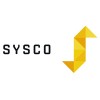Mark Prest, founder of Portraits of Recovery (PORe), on…
Redefining the Museum as a Shared Resource
Becoming an Institution of the Commons: Giulia Gregnanin, Director…
Future of Museums: Build The House They Rock In
What kind of museum will the next generation dream…
Transforming Youth Engagement in Your Museum – 28 Jan
Discover creative approaches, actionable ideas and practical tools to…
Playful Approaches to Museum Interpretation – 18 Feb
Explore the role of play and its purpose in…
Making Playable Immersive Experiences in Your Museum – 18 March
How to Make Playable Immersive Experiences in Your Museum:…
The Co-created Museum: co-creating with communities – 15 April
Gain practice-based insights into designing, developing, and delivering co-creation…
Creating Authentic and Unique Museum Experiences – 10 June
Explore the good of being different in a time…
AI and Digital Innovation in Museums – 8 July
AI is changing the way we work. Are you…
Co-production and Social Justice in Museums – 9 Sep
Join us on 9th September for the Social Justice…
Museums, Co-Creation and Making Change – 16 Sep
Join us in London for a dynamic, practical study…
Museum Ideas 2025 Conference, London – 17 Sep
“A conference for mind expanding conversations and international networking”…
How AI is Transforming Museums – 4 November
Join us for a thought-provoking and practical in-person event…
The Co-creation Game: Does Museum Co-creation Risk Becoming Performance?
Stephen Welsh on how equity and humility can flourish…
How Museums Can Shape a More Equitable and Sustainable World
The International Committee of Museums and Collections of Modern…
Museum Ideas 2024 International Conference – 10 October
“A conference for mind expanding conversations and international networking”…
The Co-created Museum: How to Approach Co-creation Projects – 9 Oct
Explore how to approach co-creation in museums in our…
How AI Will Transform Museums – 5 November 2024
AI is changing the way we work. Discover how…
Social Justice in Museums: advocacy, activism and co-production — 18 June
Join us on 18th June for the Social Justice…
AI and the Next Wave of Digital Innovation in Museums — 21 May 2024
AI is changing the way we work. Discover how…
People Centred and Community Led Interpretation — 19 March 2024
Discover how you and your museum might break free…
Museums, Co-Creation and Making Change – 20 February 2024
Discover how to achieve meaningful co-creation with communities and…
Making Playable Immersive Experiences in Your Museum – 30 January 2024
How to Make Playable Immersive Experiences in Your Museum:…
Change and Momentum in Museums: Turning Challenge into Opportunity
Steve O’Connor on getting a grip on finances, pulling…
Human Rights and Cultural Heritage: new avenues to resolve restitution claims?
The increasing intersection between art restitution and human rights…
Museum Ideas 2023 International Conference – 12 October, London
Explore the ideas shaping the future of museums and…
ResourceSpace
ResourceSpace Unit 52-53 Shrivenham Hundred Business Park Watchfield Oxfordshire…
Mather & Co
Mather & Co Century House 17 Manchester Road Wilmslow…
FutureMuseum: Decolonizing the Museum in Africa
Boubacar Diallo, Head of Collection and Inventory Department at…
Cultural Spaces as Generators of Social Change
Miranda Millward and Thomas Procter-Legg on what happens when…
2023 Conference and Study Day Programme – Museum Ideas
Explore the ideas shaping the future of museums with…
How to Create Next Generation Museum Experiences — 7 February 2023
In this study day you will co-create your own…
How to Develop Community Led Collecting & Curation — 28 March 2023
This study day will explore new approaches and ways…
How to Deliver Co-creation Projects in Your Museum — 28 February 2023
Learn how to develop and deliver co-creation policies, practice…
How to Create Immersive Games in Your Museum — 14 February 2023
In this study day participants get the unique experience…
How to Create Community-Led Queer Programming in Your Museum — 18 April
Discover how to create award-winning, community-led tours and event…
How to Use the Power of Collections in Advocacy — 16 May 2023
In this study day you will explore how museums…
Museum Ideas 2022 Conference — 6 October 2022
Explore the ideas shaping the future of museums. Join…
People Centred and Community Led Interpretation — 12 July 2022
Museums have worked with communities for years and the…
Developing Community-Led Queer Programming — 28 June 2022
Discover how to create award-winning, community-led tours and event…
Designing Museum Experiences in the Digital Age — 14 June 2022
The technologies maturing in the next ten years will…
Creating Immersive Games in Your Museum — 17 May 2022
In this study day participants get the unique experience…
Author Archives: Greg

Recoverist Month: Re-narrating Conversations on Addiction and Recovery

Mark Prest, founder of Portraits of Recovery (PORe), on how museums can play a pivotal role in reducing stigma around substance use: “We aim to embed Recoverist Month into museums’ and galleries’ public programming as a parallel to annual events like Pride Month and Black History Month”
In 2023, the UK arts organisation I founded, Portraits of Recovery (PORe), launched Recoverist Month. Its mission: to re-narrate conversations on substance use and recovery through the delivery of an annual month-long contemporary arts programme.
September was established as International Recovery Month in the US in 1989, but for me, and other people in recovery, the term Recoverist holds resonance as it reframes the subject through the lens of art. A portmanteau word, combining recovery and activist, the term embodies agency, intention, and a commitment to social and cultural change. Recoverist includes those people identifying as in active recovery, their friends, families and other allies.
Our ambition is to annually embed Recoverist-led programming into UK museums’ and galleries’ public programmes, as a parallel to more nationally established awareness events like Pride and Black History Month. Recoverist Month advocates for the same approach as these, alongside movements including women’s and disability, who took back control and reinvented themselves through their own artistic and cultural production.
There’s is a dual rationale. Firstly, it provides a platform for people and communities in recovery for visual self-representation through authentically informed new work. And secondly, Recoverist Month is an opportunity for people to be acknowledged by cultural institutions as valuable members of society, who are not catered for within a current mainstream cultural offer. I firmly believe that the arts and culture have a singular power to reframe what it means to be human by challenging culturally-embedded prejudices and tropes about a people who are perceived as not an acceptable social norm.

I first argued this case in a chapter I co-authored with Professor Alistair Roy in a collection of essays called Addiction & Performance (Cambridge Scholars Publishing 2014). We traced this way of seeing recovery communities back to thinkers including Larry Davidson, now emeritus professor of psychiatry at Yale. Larry was amongst the first to assert that recovery should be conceived as a civil rights issue, that is, that people in recovery are fundamentally human beings, just like everyone else. This idea is useful in part because it helps reframe the issues affecting people in recovery away from policy and services, and towards a more useful focus on the relationships with wider society.
A civil rights mindset also helps to align the citizenship struggles of people in recovery alongside those experienced by other marginalised groups including queer, Black and disabled people and women, who have sought to challenge and rewrite the ways in which they are perceived and represented as a part of their fight for an equal seat at the table.
All the groups mentioned above have successfully used the arts as a way to regain some level of control over their collective representation, in finding a voice and seeking to alter public perceptions – and I thank them for the blueprint their activism has provided.
Donald Winnicott’s (1972) notion of creative illusion can be useful in shedding some light on the peculiar power of the arts to affect personal and social change. He describes creative illusion as the centre point of the imaginative process that precedes transformation – that we need the freedom to imagine things differently to put an end to the status quo and allow for the emergence of new ideas.
Lynn Froggett et al. (2011) describe how the arts can provide a focal point around which problematic ideas, associations or relationships can be reconfigured. From our perspective, when people in recovery take part in meaningful cultural production, this allows them to realise control over this representation. This challenges, existing societal perceptions, reduces stigma, and leads to the development of a cultural identity for the recovery community and a sense of cultural citizenship for its members.
Portraits of Recovery believes that contemporary arts practice and cultural and heritage spaces offer huge potential for visually redefining authentic explorations of addiction and recovery. Our argument then, as it remains now, is that the arts can be a key component of individual and collective resistance, and that meaningful artistic and cultural production around addiction and recovery can make recovery communities and recovery itself more visible, transparent, and better understood.

This year Recoverist Month will see exhibitions, a painterly animated film premiere and more at venues around Manchester, UK, including the Whitworth, Castlefield Gallery, Manchester Museum and HOME.
Three exhibitions, all co-produced by Portraits of Recovery, run throughout September. Recoverist Curators: Re-imagining The World We Live In at The Whitworth (until June 2026) is co-curated by six people in recovery. Over 12 months of exhibition development, they selected over 25 works that re-frame the Whitworth’s collection and simultaneously re-narrate their individual journeys of recovery. Personal testimonies, histories and artefacts intersect with works by artists including Francis Bacon, Tracey Emin and Wolfgang Tillmans, bringing new meanings.
ANEW Way to Peel an Orange at Castlefield Gallery (until 19 October 2025) showcases artworks co-created between designer Joe Hartley and Greater Manchester recovery community ANEW, where he spent five months as artist in residence. The collaboratively made exhibition includes a diverse collection of new work that developed out of the residency. Horsepower reimagines the Victorian botanical illustration as a 6m high spray-painted mural, whilst Pos and Negs explores how collectively hand-built sculptural teapots inspired a series of black and white photographs, which in themselves led to the making a further second, teapot generation.
At HOME, Artefacts of Interaction, a collaboration between Portraits of Recovery, Venture Arts and HOME and artist led by Will Bellshan explores the intersection between neurodivergence, substance use (prescribed or illicit) and artistic practice. Four large scale co-created paintings, described as ‘living meditative conversations’ by lead artist Will Belshah, are on exhibition 6 September 2025 -11 January 2026.
African Objects: Psychoactives, Spirituality & Mental Health will showcase a project led by transdisciplinary lead artist Divine Southgate-Smith, in collaboration with people from Black and African-Caribbean communities. Together they explored spirituality, mental health and recovery.
Curated by Southgate-Smith, this event will be a collaborative and poetic response to the project’s outcomes and objects chosen from Manchester Museum’s Living Cultures collection, exploring their psychological and societal implications within the African diaspora (30 Sep 2025 at 6pm-8pm, Living Worlds Gallery, Manchester Museum).
The premiere of award-winning filmmaker and Royal College of Art graduate Oscar Wyndham Lewis’s new short film, Small Hours: A Portrait of Alcoholism, is at Everyman Cinema on 23 September 2025. Narrated by Robert Bathurst (Downton Abbey, Cold Feet, Toast of London), the 13-minute hand painted animation about an artist in the end stages of alcoholism, captures those critical moments in life that lead us down wildly different paths.
And finally, the Chaordic Symposium (25 September 2025, (the Whitworth) will share insights into the transformative power of the arts within recovery, showcasing the learning and creative outcomes from a major three-year commissioning programme. It is delivered in partnership with Manchester Art Gallery, the Whitworth and Castlefield Gallery. Speakers include Dame Carol Black, who was commissioned by the UK Government to produce an independent review of drug treatment (2020/21), Peter Heslip, Director Visual Arts, Arts Council England, David Cutler, CEO Baring Foundation and Dr Clive Parkinson (former director Arts for Health at MMU).
Recoverist Month is more than a growing annual programme and movement – it’s a call to action for reimagining who cultural spaces are for, and what narratives they hold. It invites audiences to shift their thinking, to identify and not compare and to lift recovery communities out of the shadows and into the centre of cultural life. As the arts have done for others, they can serve as a catalyst for visibility, voice and Recoverist transformation. This September, through exhibitions, performances and conversation, we’re building a cultural legacy rooted in radical hope and authentic representation. By centring Recoverist voices in our galleries and museums, we’re not only challenging stigma, but we’re also creating space for reimagined futures made real. Are you ready to join this sea change?
Mark Prest
Founder, Portraits of Recovery (PORe)
Article published Monday 8 Sep 2025

Redefining the Museum as a Shared Resource
Becoming an Institution of the Commons: Giulia Gregnanin, Director… Continue Reading

Future of Museums: Build The House They Rock In
What kind of museum will the next generation dream… Continue Reading

Transforming Youth Engagement in Your Museum – 28 Jan
Discover creative approaches, actionable ideas and practical tools to… Continue Reading

Playful Approaches to Museum Interpretation – 18 Feb
Explore the role of play and its purpose in… Continue Reading

Making Playable Immersive Experiences in Your Museum – 18 March
How to Make Playable Immersive Experiences in Your Museum:… Continue Reading

The Co-created Museum: co-creating with communities – 15 April
Gain practice-based insights into designing, developing, and delivering co-creation… Continue Reading

Creating Authentic and Unique Museum Experiences – 10 June
Explore the good of being different in a time… Continue Reading

AI and Digital Innovation in Museums – 8 July
AI is changing the way we work. Are you… Continue Reading

Co-production and Social Justice in Museums – 9 Sep
Join us on 9th September for the Social Justice… Continue Reading

Museums, Co-Creation and Making Change – 16 Sep
Join us in London for a dynamic, practical study… Continue Reading

Museum Ideas 2025 Conference, London – 17 Sep
“A conference for mind expanding conversations and international networking”… Continue Reading

How AI is Transforming Museums – 4 November
Join us for a thought-provoking and practical in-person event… Continue Reading

The Co-creation Game: Does Museum Co-creation Risk Becoming Performance?
Stephen Welsh on how equity and humility can flourish… Continue Reading

How Museums Can Shape a More Equitable and Sustainable World
The International Committee of Museums and Collections of Modern… Continue Reading

Museum Ideas 2024 International Conference – 10 October
“A conference for mind expanding conversations and international networking”… Continue Reading
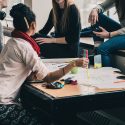
The Co-created Museum: How to Approach Co-creation Projects – 9 Oct
Explore how to approach co-creation in museums in our… Continue Reading

How AI Will Transform Museums – 5 November 2024
AI is changing the way we work. Discover how… Continue Reading
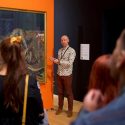
Social Justice in Museums: advocacy, activism and co-production — 18 June
Join us on 18th June for the Social Justice… Continue Reading

AI and the Next Wave of Digital Innovation in Museums — 21 May 2024
AI is changing the way we work. Discover how… Continue Reading

People Centred and Community Led Interpretation — 19 March 2024
Discover how you and your museum might break free… Continue Reading

Museums, Co-Creation and Making Change – 20 February 2024
Discover how to achieve meaningful co-creation with communities and… Continue Reading
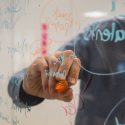
Making Playable Immersive Experiences in Your Museum – 30 January 2024
How to Make Playable Immersive Experiences in Your Museum:… Continue Reading

Change and Momentum in Museums: Turning Challenge into Opportunity
Steve O’Connor on getting a grip on finances, pulling… Continue Reading

Human Rights and Cultural Heritage: new avenues to resolve restitution claims?
The increasing intersection between art restitution and human rights… Continue Reading

Museum Ideas 2023 International Conference – 12 October, London
Explore the ideas shaping the future of museums and… Continue Reading

ResourceSpace
ResourceSpace Unit 52-53 Shrivenham Hundred Business Park Watchfield Oxfordshire… Continue Reading

Mather & Co
Mather & Co Century House 17 Manchester Road Wilmslow… Continue Reading

FutureMuseum: Decolonizing the Museum in Africa
Boubacar Diallo, Head of Collection and Inventory Department at… Continue Reading

Cultural Spaces as Generators of Social Change
Miranda Millward and Thomas Procter-Legg on what happens when… Continue Reading

2023 Conference and Study Day Programme – Museum Ideas
Explore the ideas shaping the future of museums with… Continue Reading

How to Create Next Generation Museum Experiences — 7 February 2023
In this study day you will co-create your own… Continue Reading
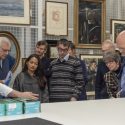
How to Develop Community Led Collecting & Curation — 28 March 2023
This study day will explore new approaches and ways… Continue Reading

How to Deliver Co-creation Projects in Your Museum — 28 February 2023
Learn how to develop and deliver co-creation policies, practice… Continue Reading

How to Create Immersive Games in Your Museum — 14 February 2023
In this study day participants get the unique experience… Continue Reading

How to Create Community-Led Queer Programming in Your Museum — 18 April
Discover how to create award-winning, community-led tours and event… Continue Reading
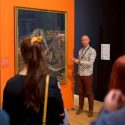
How to Use the Power of Collections in Advocacy — 16 May 2023
In this study day you will explore how museums… Continue Reading

Museum Ideas 2022 Conference — 6 October 2022
Explore the ideas shaping the future of museums. Join… Continue Reading

People Centred and Community Led Interpretation — 12 July 2022
Museums have worked with communities for years and the… Continue Reading

Developing Community-Led Queer Programming — 28 June 2022
Discover how to create award-winning, community-led tours and event… Continue Reading

Designing Museum Experiences in the Digital Age — 14 June 2022
The technologies maturing in the next ten years will… Continue Reading
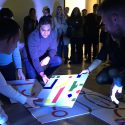
Creating Immersive Games in Your Museum — 17 May 2022
In this study day participants get the unique experience… Continue Reading




















